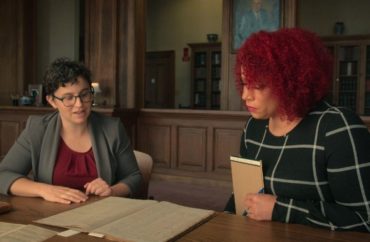
‘Incoherent narrative that the 1619 Project builds in its attempt to link modern Amazon warehouses to slavery offers no meaningful insights about the history or economic workings of either institution,’ historian writes
The new “Capitalism” episode of Hulu’s recently released “1619 Project” series is historically shoddy to a dangerous degree, historian Phillip Magness wrote Feb. 12 for National Review.
The Hulu six-part series is “an expansion of the New York Times Magazine’s “The 1619 Project,” created and starring Pulitzer Prize-winning journalist Nikole Hannah-Jones.
“The series seeks to reframe the country’s history by placing the consequences of slavery and the contributions of Black Americans at the very center of our national narrative,” according to its online description.
The capitalism episode follows Hannah-Jones seeking out a brief definition of the term after admitting at the outset: “I don’t feel like most of us actually know what capitalism means.”
She first consults historian Seth Rockman at Brown University, who stated in a 2014 article that slavery is “integral, rather than oppositional, to capitalism.”
In the episode, he rejects the common dictionary definition that capitalism is “a system of private property in which the free market coordinates buyers and sellers.” Instead, “it’s not really clear” what capitalism is, he tells Hannah-Jones, though the impression is it definitely has a lot to do with slavery.
American slavery “can never be separated from the history of capitalism,” according to Rockman. He explains this with the claim that slave-produced goods were used in economic activity worldwide.
However, “the same reductionist logic could be used to deem the entire modern American economy a simple appendage of the economic system of China, Venezuela, or any other autocratic regime with which we trade or have financial entanglements,” wrote Magness, a research fellow at the Independent Institute and senior research fellow at the American Institute for Economic Research.
The “simple presence of trade, exchange, and financial institutions is not exclusive to capitalism. These have been features of almost every society in human history, free and unfree,” continued Magness, who has a doctorate in history from George Mason University.
Historian Rockman also asserts an intrinsic link between slave-grown cotton and the American industrial revolution: “If you don’t have slave-grown cotton, you don’t have an American industrial revolution.”
Yet Magness counters this by noting “history provides numerous examples — Canada, Japan, several European states — of economies that underwent massive industrialization in the 19th century without the alleged benefits of slavery.” Even more, he added, “the plantation system may have enriched a small, elite group of slave-owners during its existence, but slavery is unambiguously harmful to economic development in the long run.”
More fundamentally, economists have “long rejected” the practice of explaining the economic history of an entire era in terms of one good or product, such as oil or railroads — or slave-picked cotton, he wrote.
‘Racial capitalism is capitalism — they’re one and the same,’: UCLA historian
The history doesn’t get better when Hannah-Jones proceeds to her second consultant, Professor Robin D.G. Kelley, a historian at UCLA. Kelly tells Hannah-Jones that “the reality is that capitalism is based on the exploitation of labor. It’s that simple.”
Magness debunks this, too: “Ancient Roman slavery, medieval feudalism, Soviet-era gulags, and North Korean prison camps today would also qualify as ‘capitalism’ if we reduce the concept to exploitative worker conditions, and indeed that is how Hannah-Jones, under Kelley’s aggressively ideological guidance, proceeds.”
Kelly also states in the episode that “racial capitalism is capitalism — they’re one and the same.”
Counters Magness: “The viewer is left to make the next deduction, namely that capitalism itself is inherently racist and therefore deserving to be jettisoned.”
Overall, “the 1619 Project’s derivative interpretation of slavery emerges from a branch of the academy that has chosen to isolate itself from most modern scholarly works on the economics of slavery, even as it advances an unfounded assertion of its own novelty,” Magness wrote.
The New York Times original “1619 Project” entrusted the topic of American capitalism, which has been exhaustively studied by historians, to Princeton sociologist Matthew Desmond, whose “research focuses on poverty in America, city life, housing insecurity, public policy, racial inequality, and ethnography,” according to his faculty bio.
When it comes to the historical analysis of capitalism, Desmond is a “novice without any scholarly expertise or methodological training,” Magness wrote. “The resulting essay blended empirical error with a basic misreading of the academic literature to almost comical ends.”
Desmond “casually repeated a thoroughly debunked statistical claim from a ‘New History of Capitalism’ (NHC) scholar Ed Baptist, who erroneously attributes the growth of the antebellum cotton industry’s crop yield to the increased beating of slaves (it was actually due to improved seed technology).”
Desmond is “conspicuously absent” from the Hulu episode, Magness wrote. Instead, the short film repeatedly alternates images of historical photos of antebellum slaves and footage of an Amazon distribution center.
This is “morally offensive analogy, stripped of any sense of proportion or understanding of slavery’s abject brutality,” he wrote. “At this point the episode thrusts itself into a political crusade to unionize an Amazon warehouse in Bessemer, Ala.”
“The ideological core of the series’s ‘capitalism’ episode” is based “on a droning foray into Marxist theorizing.”
“As [Hannah-Jones] cast about for new sources to salvage her narrative, she eventually landed in the fringes of academic Marxism,” Magness wrote.
However, the “incoherent narrative that the 1619 Project builds in its attempt to link modern Amazon warehouses to slavery offers no meaningful insights about the history or economic workings of either institution,” Magness said.
MORE: Professors tell New York Times to correct the many errors in its 1619 Project
IMAGE: Vulture
Like The College Fix on Facebook / Follow us on Twitter






Please join the conversation about our stories on Facebook, Twitter, Instagram, Reddit, MeWe, Rumble, Gab, Minds and Gettr.